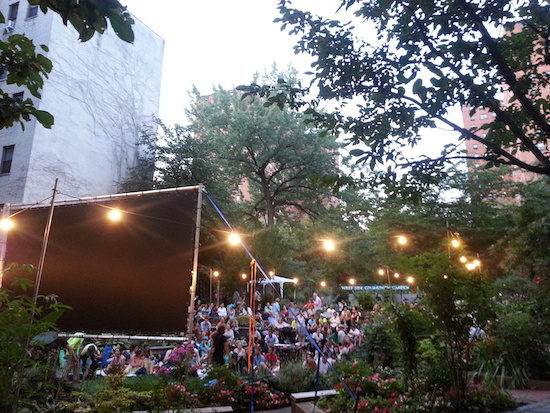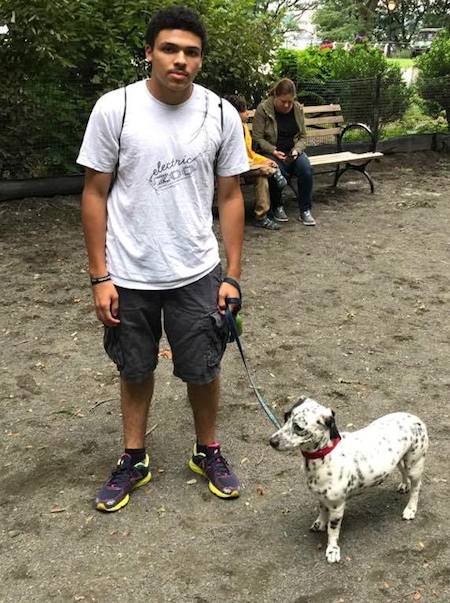
Executive Director Dr. Roderick L. Jones at his desk. Photo by Hannah Reale.
By Hannah Reale
Back in February, Goddard Riverside’s former executive director, Stephan Russo, stepped down from his post after 18 years. Formed by the merger of two large settlement houses in 1959, Goddard is a vast social service organization that runs programs for all ages: from daycare, to homeless outreach, to legal services, to tutoring and college readiness, to food programs for seniors, among many others. So Goddard needed a special leader who can mobilize and inspire workers and volunteers in all of those areas. They found a native New Yorker who had already made a big impact elsewhere.
Dr. Roderick L. Jones took the job earlier this year and has slowly transitioned into the role, with aid from the board and Russo. The St. Louis American Foundation named Jones the top non-profit executive director for his work as president of Grace Hill Settlement House in St. Louis in 2010. His background is primarily in youth services, and he has worked with various settlement houses in the past to oversee mergers and internal restructuring. Although he hasn’t worked for Goddard in the past, he “knew of Goddard and its work, in both helping to build the Upper West Side and some of its major programs.”
“I’m a native of Brooklyn originally, and after being gone for 30 years, I wanted to give back to New York,” Jones said, “but professionally I wanted to make sure that I continued my work in the settlements.”
He went on to discuss what guides him in his work: “A principle that I bring to every position that I come to, in every organization that I’ve run, is a notion of gratitude. I recognize every single day that it did not have to be me. That, in the grand scheme of things, none of us could negotiate with God who our parents were. And I grew up in public housing with a significant number of young people who never made it out. But what I’m aware of, and conscious of, is the number of young people and the number of people who never reach their fullest potential, not because they affirmatively acted—not because they did things wrong—[but] it was often in the absence of doing something that was necessary. And it was often not done, not because people were lazy, it was done because you didn’t know. And I realized that, along my pathway, people have told me what I needed to do.”
Jones emphasized the massive scale that Goddard works at: it’s a non-profit organization that employs nearly 550 people and provides service for 20,000 community members every year. At many points, however, he came back to more abstract themes: faith and destiny. “You must know that you were born with a purpose, and you might not see it right away, but I remember when polio was common. I remember people who had polio. But the vaccine was created for polio when we never believed it would be done. And so, in this pathway, I’m reminded that we have to be careful about what we believe about people, and I bring that to my work. Every person is a gift to us.”
At the end of the day, Jones sees Goddard and his position as executive director in very simple terms: “We are the place where people call home…. It’s my job to make sure that every neighbor is my neighbor.”

Board President Christopher Auguste. Photo courtesy of Christopher Auguste.
New Board President Christopher Auguste came upon Goddard in a different way; his high school English teacher suggested that he volunteer with the program, and he has worked his way up in the board over the past decades. He’s a partner at Kramer Levin Naftalis & Frankel LLP, a law firm in Midtown Manhattan. At Goddard, he primarily does his work on the financial committee, managing the organization’s budget, and at the Options Center, helping high school students who want to receive a higher education.
Auguste reflected on the board and the organization more generally, commenting on members’ unique devotion to working together in order to best serve the community. “On any given day, one can say: It’s important that Goddard is in our community…. [The organization’s] impact is real and permanent. The programs are institutionalized.”
He spoke fondly of Betsy Newell, who just retired from the position of board president this past May and has been involved in programs at Goddard since 1950. “Betsy’s sort of unique because she was a young person that got involved through her parents. She’s sort of an institution and her love for the organization and the programs shapes the board.”
As for the future of Goddard Riverside? Don’t expect any major changes in the next year.
Jones outlined steps that the organization will be taking in the near future to evaluate their role within the community, taking feedback from Upper West Siders, as well as ensuring that they are offering as much value to the neighborhood as possible and properly advocating for community members. “The most important thing is: are we having the impact we need to have?” Auguste posed. “We’re looking forward to assessing our programs to make sure we’re helping our neighbors.”








